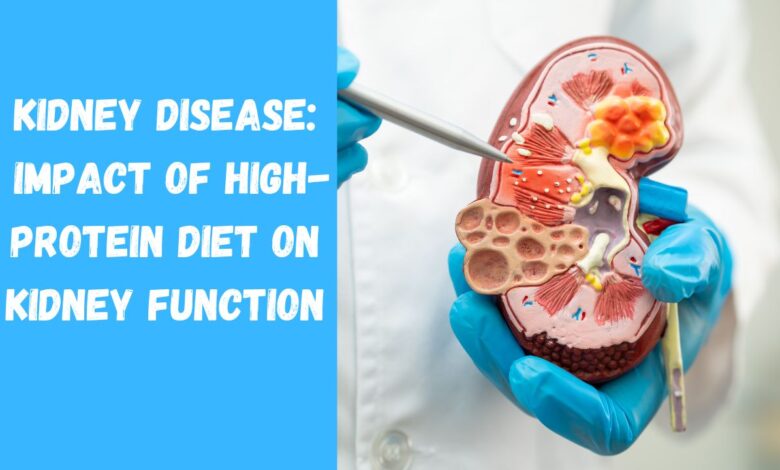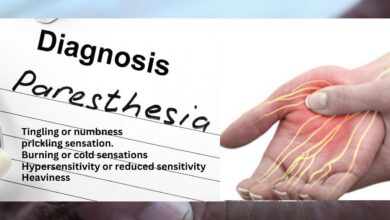
Kidney Disease:Explore how high-protein diets affect kidney function, the risks involved, and effective prevention strategies. Learn about balanced diets, hydration, and lifestyle changes to support kidney health and manage kidney disease.
Table of Contents
Introduction
Kidney disease is a serious health condition affecting millions worldwide. Our kidneys play a crucial role in filtering waste products, balancing body fluids, and maintaining electrolyte levels. However, various factors, including diet, can impact their function. Recently, high-protein diets have gained popularity, especially among fitness enthusiasts and those aiming to lose weight. This article explores how a high-protein diet affects kidney function, the associated risks, and ways to prevent kidney disease.
Understanding Kidney Function
Before diving into the impact of diet, it is essential to understand how kidneys work. Kidneys are two bean-shaped organs located on either side of the spine, just below the rib cage. Each kidney contains about a million tiny filtering units called nephrons. These nephrons remove waste and extra fluids from the blood, which are then excreted as urine. Besides waste removal, kidneys also:
- Regulate blood pressure
- Produce hormones that help control red blood cell production
- Maintain the body’s acid-base balance
High-Protein Diets: An Overview
A high-protein diet emphasizes consuming more protein-rich foods such as meat, fish, eggs, dairy products, legumes, and nuts. This type of diet is often associated with muscle building, weight loss, and improved metabolic health. Typically, a high-protein diet includes:
- Lean meats: Chicken, turkey, and lean cuts of beef
- Fish and seafood: Salmon, tuna, shrimp, and other seafood
- Eggs: Whole eggs and egg whites
- Dairy: Milk, yogurt, and cheese
- Legumes: Beans, lentils, and peas
- Nuts and seeds: Almonds, chia seeds, and flaxseeds
While these foods can be part of a healthy diet, consuming them in excess can pose risks to kidney health, especially for those with pre-existing conditions.
Impact of High-Protein Diet on Kidney Function
Increased Kidney Workload
One of the primary functions of the kidneys is to filter waste products from the blood. Protein metabolism produces nitrogenous wastes, mainly urea, which the kidneys need to eliminate. A high-protein diet increases the production of these wastes, putting extra strain on the kidneys. This heightened workload can be problematic, especially for individuals with existing kidney issues.
Glomerular Filtration Rate (GFR)
The glomerular filtration rate (GFR) measures how well the kidneys are filtering blood. Studies suggest that a high-protein diet can increase GFR temporarily, indicating a higher filtration rate. While this might seem beneficial, it actually signifies that the kidneys are working harder than usual, which can lead to damage over time.
Risk of Kidney Stones
High-protein diets, particularly those rich in animal protein, can increase the risk of kidney stones. This is because animal protein raises the levels of calcium and oxalate in the urine, which are primary components of kidney stones. Additionally, high protein intake can reduce urine pH, making it more acidic and further increasing the risk of stone formation.
Risks Associated with High-Protein Diets
Chronic Kidney Disease (CKD)
For individuals with chronic kidney disease (CKD), managing protein intake is crucial. CKD is characterized by a gradual loss of kidney function over time. A high-protein diet can accelerate this process by increasing the workload on already damaged kidneys, potentially leading to kidney failure.
Dehydration
Protein metabolism requires more water than fats or carbohydrates. High-protein diets can lead to dehydration if not accompanied by adequate fluid intake. Dehydration further complicates kidney function, as the kidneys need sufficient water to flush out waste products effectively.
Hypertension
High-protein diets, particularly those high in red and processed meats, are associated with an increased risk of hypertension (high blood pressure). Hypertension is a significant risk factor for kidney disease, as it can damage the blood vessels in the kidneys, reducing their ability to function properly.
Prevention and Management
Balanced Diet
The key to preventing kidney disease and managing existing conditions is a balanced diet. While protein is essential for muscle repair and overall health, it should be consumed in moderation. A diet that includes a variety of nutrients from different food groups supports kidney health.
- Vegetables and fruits: Provide essential vitamins, minerals, and antioxidants.
- Whole grains: Offer fiber and essential nutrients without overloading the kidneys.
- Healthy fats: Found in olive oil, avocados, and nuts, these fats support overall health without burdening the kidneys.
Hydration
Staying well-hydrated is crucial for kidney function. Water helps dissolve nutrients and minerals, making it easier for the kidneys to filter waste. Aim for at least 8-10 glasses of water a day, more if you are physically active or live in a hot climate.
Regular Monitoring
For those at risk of kidney disease or those already diagnosed, regular monitoring of kidney function is essential. Blood tests measuring GFR and urine tests can help detect changes in kidney function early, allowing for timely intervention.
Limit Processed Foods
Processed foods often contain high levels of sodium and unhealthy fats, which can strain the kidneys. Reducing intake of processed foods, including fast food, canned soups, and pre-packaged meals, can help maintain kidney health.
Exercise
Regular physical activity helps manage weight, reduces blood pressure, and improves overall health. Aim for at least 30 minutes of moderate exercise, such as walking or swimming, most days of the week.
Special Considerations for Different Populations
Athletes and Bodybuilders
Athletes and bodybuilders often consume high-protein diets to support muscle growth and recovery. While they may require more protein than the average person, it is important to balance protein intake with adequate hydration and a variety of other nutrients. Consulting with a nutritionist or dietitian can help optimize diet for performance and health.
Older Adults
As people age, their kidney function naturally declines. Older adults should be particularly cautious about high-protein diets, as their kidneys may not be able to handle the increased workload. A diet rich in fruits, vegetables, and moderate protein, tailored to individual health needs, is advisable.
Individuals with Pre-existing Conditions
For individuals with diabetes, hypertension, or a family history of kidney disease, careful dietary management is crucial. These individuals should work closely with healthcare providers to design a diet that supports overall health while protecting kidney function.
Also Read:Health Benefits Of Intermittent Fasting
Conclusion
Kidney disease is a significant health concern that can be influenced by diet, particularly high-protein diets. While protein is an essential nutrient, excessive intake can strain the kidneys, increase the risk of kidney stones, and accelerate the progression of chronic kidney disease. By adopting a balanced diet, staying hydrated, limiting processed foods, and engaging in regular exercise, individuals can support their kidney health and reduce the risk of kidney disease. Regular monitoring and consultation with healthcare professionals are also key in managing and preventing kidney-related issues. Remember, moderation and balance are the keys to a healthy diet and healthy kidneys
The information provided in this article is for educational purposes only and is not intended as medical advice. Always consult with a healthcare professional or registered dietitian before making any changes to your diet or exercise routine, especially if you have existing health conditions such as kidney disease. The content is based on current research and understanding, but individual needs and responses to dietary changes can vary. The author and publisher are not responsible for any adverse effects or consequences resulting from the use of the information provided.




